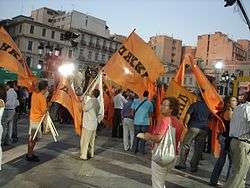Democratic Social Movement
The Democratic Social Movement (DIKKI, Greek: ΔΗΚΚΙ, Δημοκρατικό Κοινωνικό Κίνημα, Dimokratiko Koinoniko Kinima) is a Greek democratic socialist political party. The party was founded in 1995 by Dimitris Tsovolas and several ex-members of the Panhellenic Socialist Movement (PASOK), the then ruling social-democratic party.
Democratic Social Movement Δημοκρατικό Κοινωνικό Κίνημα | |
|---|---|
 | |
| Abbreviation | DIKKI |
| Founder | Dimitris Tsovolas |
| Founded | 1995 |
| Split from | Panhellenic Socialist Movement (PASOK) |
| Ideology | Socialism[1] Social democracy[2] Soft Euroscepticism[3] Left-wing nationalism[1] |
| Political position | Left-wing[4] |
| National affiliation | Popular Unity (LAE) |
| Website | |
| www | |

History
Formation and early success
In the 1996 legislative election, DIKKI received 4.43% of the vote and 9 seats in the Hellenic Parliament. In the 1999 election to the European Parliament, the party received 6.85% of the vote and 2 seats in the European Parliament, and was a full member of the European United Left - Nordic Green Left group.[5]
Failures and disputes
After these initial successes, however, DIKKI failed to elect members to the Hellenic Parliament on two consecutive elections; it received 2.69% of the vote in the 2000 legislative election and 1.8% of the vote in the 2004 legislative election.
After the 2004 election, Tsovolas unilaterally decided to dissolve DIKKI and give the party possessions away to the Greek state. That decision led to a conflict between the party leader and the National Committee, who voted against the dissolution; there are accusations that Tsovolas went through these actions, because he was planning to be readmitted in PASOK in the near future.[6] The National Committee went to law and the court ruled that the party is legally administered by the national executive bodies, thus it cannot cease to exist unless the National Congress or the National Committee takes such decision. The party possessions were returned and Tsovolas was expelled.
Reorientation
In the local elections of 2006 DIKKI supported many tickets led by the Communist Party of Greece (KKE), and numerous party members (for the size of the party) were elected in local councils. Moreover, DIKKI participated in All Workers Militant Front (PAME), a trade unionist coordination centre closely related with KKE.
Although it was expected that co-operation between the two parties would become permanent, on August 22, 2007 DIKKI announced that it was participating in the Coalition of the Radical Left (SYRIZA),[7] which received 5.04% of the vote in the legislative election held on September 16, 2007.
On February 20, 2015, the party announced it was severing ties with SYRIZA.
In the summer of 2015, it joined an alliance with Popular Unity. It would remain affiliated until June of 2019, when it joined an electoral coalition with the United Popular Front.
Electoral results
Parliament
| Election year | # of overall votes | % of overall vote | # of seats won | +/- |
|---|---|---|---|---|
| 1996 | 300.954 | 4.4 (#5) | 9 / 300 |
|
| 2000 | 184.598 | 2.7 (#5) | 0 / 300 |
|
| 2004 | 132.933 | 1.8 (#6) | 0 / 300 |
European Parliament
| Election year | # of overall votes | % of overall vote | # of seats won | +/- |
|---|---|---|---|---|
| 1999 | 440.191 | 4.7 (#4) | 2 / 25 |
References
- Anagnostou, Dia (2006), "Deepening Democracy or Defending the Nation? The Europeanisation of Minority Rights and Greek Citizenship", Politics and Policy in Greece, Routledge, p. 128
- Ari-Veikko Anttiroiko; Matti Mälkiä (2007). Encyclopedia of Digital Government. Idea Group Inc (IGI). pp. 398–. ISBN 978-1-59140-790-4. Retrieved 18 July 2013.
- "Greece: Directory", Central and South-Eastern Europe 2004, Europa Publications, p. 294, 2003
- Clogg, Richard (2003), "Greece: History", Central and South-Eastern Europe 2004, Europa Publications, p. 280
- GUE/NGL Site
- "P. Mantas, Tsovolas expelled his history on his own". Archived from the original on 2008-12-04. Retrieved 2008-12-12.
- DIKKI press release Archived 2008-01-22 at the Wayback Machine
External links
- Official website

- Greek election results, via the Greek Ministry of Internal Affairs